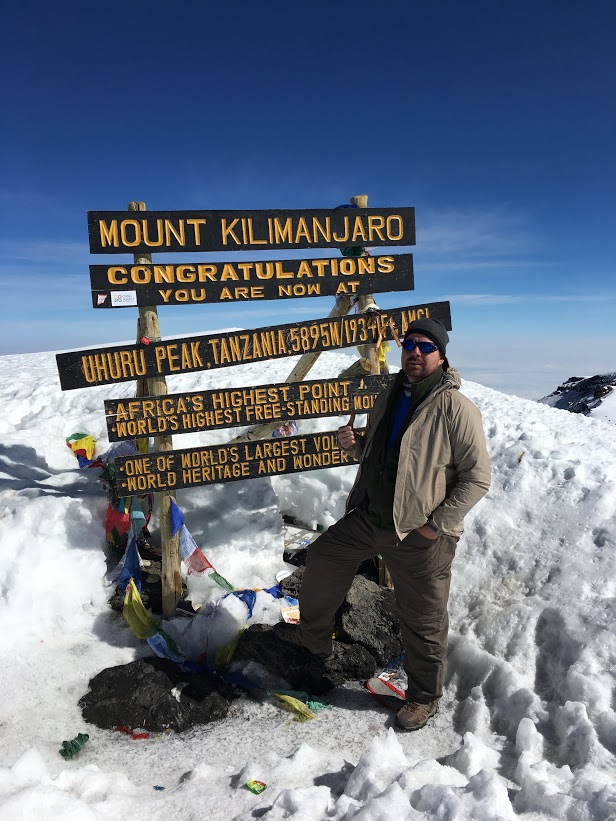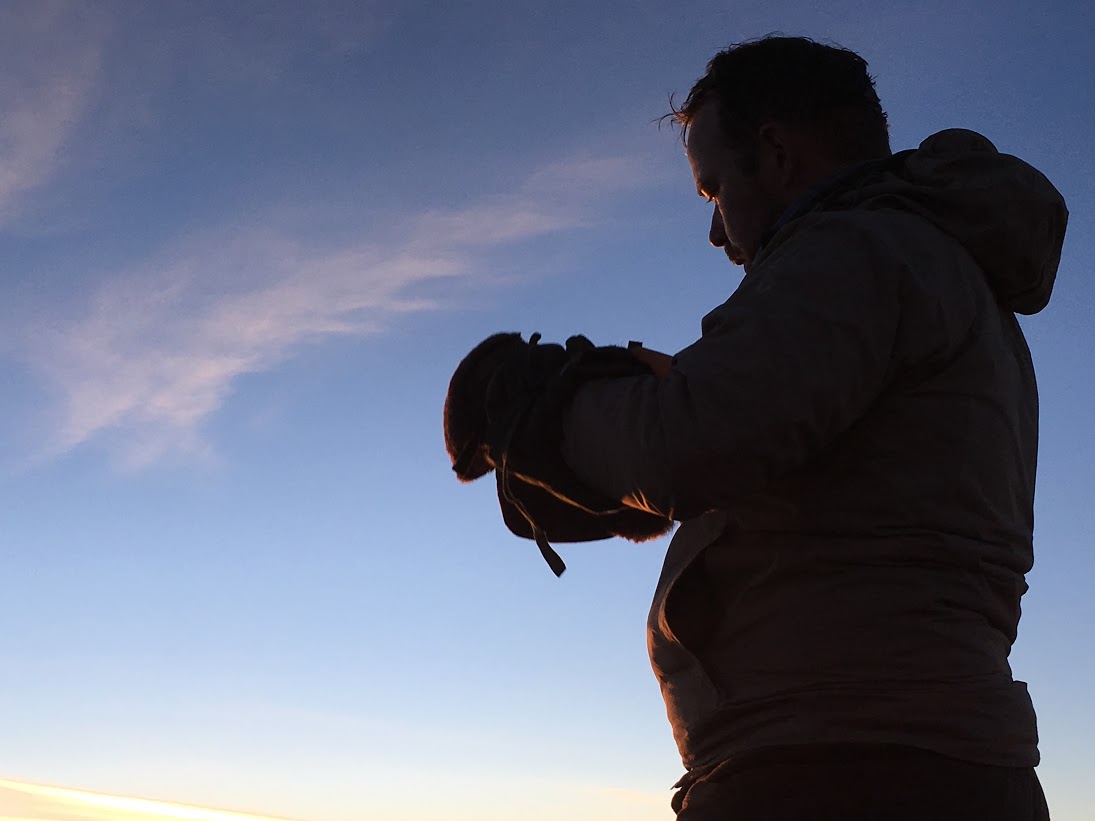A School Library's Fundraising and Advocacy Campaign in Alabama
A climb up Mount Kilimanjaro and a mission to improve a district's libraries while motivating others to advocate for themselves.
When Andrew Maxey and his father and brother finally planned their long-dreamed about adventure to climb Mount Kilimanjaro, the Tuscaloosa (AL) City Schools (TCS) director of special programs knew he needed to use this summer’s trip to bring attention to the importance of school libraries and his district’s efforts to improve theirs.

Andrew Maxey at the peak of Mount Kilimanjaro.
“My main intention was to try to start the conversation,” says Maxey, who describes himself as the district’s “liaison” between librarians and the administration. In this case, the conversation is about the state of the TCS libraries—particularly the age of the collections—and explaining the connection between those outdated collections and education’s goal.
“I think is astoundingly disingenuous and hypocritical to act like we can produce strong readers without having excellent libraries and qualified librarians,” Maxey says. “Producing strong readers is the mission upon which everything else we do is built.”
While he brought the discussion to the public before and after his July climb, it’s a subject he and his district’s librarians and staff have been talking about within the district for years.
“I’ve not ever been a librarian, but it seems like the only people talking about this is librarians,” he says. “Where are the other folks? And because librarians have been marginalized, it’s easy to ignore the whole group. Even the best advocates within the group don’t get much traction except with other librarians.”
 The ongoing internal conversation at TCS schools, backed by the data from collection analysis, helped the board of education see the vital need and back a fundraising initiative. The last week of August, the TCS board officially supported and launched Strong Libraries, Strong Schools, with the goal of raising $1.7 million to update all of the district’s libraries and add one more in a school that doesn’t have one. They haven’t begun an official fundraising push yet and are working on a specific strategy but have about $6,000 so far thanks to stories about his climb and the initiative, according to Maxey. There is no real timeline for the project.
The ongoing internal conversation at TCS schools, backed by the data from collection analysis, helped the board of education see the vital need and back a fundraising initiative. The last week of August, the TCS board officially supported and launched Strong Libraries, Strong Schools, with the goal of raising $1.7 million to update all of the district’s libraries and add one more in a school that doesn’t have one. They haven’t begun an official fundraising push yet and are working on a specific strategy but have about $6,000 so far thanks to stories about his climb and the initiative, according to Maxey. There is no real timeline for the project.
“We expect it’s going to take multiple years and are committed to that,” says Maxey.
Funding initiatives such as this one—and others around the country to keep librarians in schools or improve school libraries—can be seen as an indictment of the state of education in the United States.
“What does it say about public education? We’re chasing the wrong rabbit, absolutely chasing the wrong goals,” says Maxey. Focusing on test scores doesn’t work, he says, and acting as if literacy only means “reading instruction” is detrimental. It’s only a piece of literacy. Once students have been taught how to read, they need to have access to quality books and encouraged to develop a love for reading.
“The irony is enormous to me that I even have to say we need to give kids good books,” Maxey says, suggesting the conversations about education in this country should be about the nuances and philosophies, not fundamental needs like a library stacked with up-to-date, quality books that would be interesting to the kids in the school.
Alabama schools are lucky enough to have librarians, but with defunded libraries, there’s only so much they can do, according to Maxey. The lack of funding is particularly harmful in high poverty areas of the county.
“When a community doesn’t have money to pay for books out of pocket, they don’t get them,” he says, adding that with only three branches of the public library in their large county, telling kids to go to the public library is not a practical solution. The answer is to update school collections with books that the kids would find interesting and engaging.
“We know how important nonfiction text is, and nonfiction text doesn’t age well,” he says. “No nine-year-old is dying to read a biography of Madonna. That’s a book that needs to be weeded.”
In some cases, old nonfiction material is “actively harmful” not just uninteresting to a new generation, he says. “You don’t want kids to read books about science and medicine that are 10-15 years old and be misinformed.”

Maxey during Mount Kilimanjaro climb this past summer.
For Maxey and the district’s superintendent and librarians, this mission and vision goes beyond Tuscaloosa.
“We feel a responsibility for advocacy outside of our district,” Maxey says. “We’ve put together a toolkit and inviting others to start the process, for schools to tell their library story – the truth about their collections, the special things they do. We’re using the hashtag #mylibrarystory.” The toolkit contains collection analysis resources, collaboration with content area teachers and advocacy and communication tools.
“We don’t just want to be a news story – ‘Hey, good for them,’” he says. “We don’t want to be a story of exceptionality, we want to be a story of hope, to say this is such a powerful thing, you do it too. Try it. It is possible.
“The message is if you’re the only person doing something, you could make a difference but start chipping away, start talking, start telling your story. It make take you years, but It’ll be years from when you start whenever you start, so why not start today?”
RELATED
The job outlook in 2030: Librarians will be in demand
The job outlook in 2030: Librarians will be in demand
ALREADY A SUBSCRIBER? LOG IN
We are currently offering this content for free. Sign up now to activate your personal profile, where you can save articles for future viewing






Add Comment :-
Be the first reader to comment.
Comment Policy:
Comment should not be empty !!!